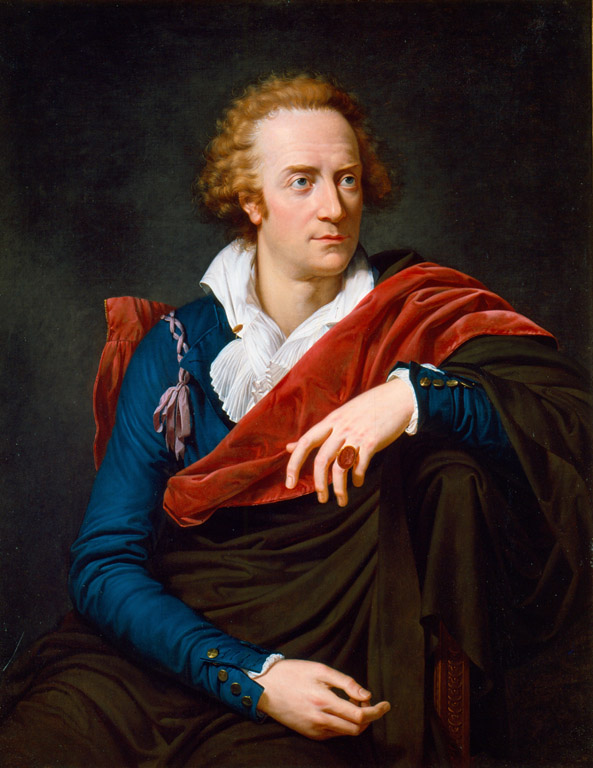„Dowodem odwagi nie jest umrzeć, lecz żyć.”
Spesso è da forte più che il morire, il vivere. (wł.)
Źródło: Oreste, 1785
Vittorio Alfieri , włoski pisarz. Dramaturg uznawany za ojca włoskiej szkoły dramatycznej , autor poezji i pism politycznych . W swoich dramatach, opartych głównie na mitologii greckiej, Alfieri poruszał problem tyranii i jej przezwyciężenia. Jego zamiarem było danie Włochom dramatów porównywalnych z osiągnięciami innych narodów. Alfieri pisał też komedie, satyry, sonety i epigramaty.
Wspomniana tragedia Saul została przełożona na język polski przez Karola Łopuszańskiego. Jest ona uważana za największą klasyczną włoską tragedię. Własną wersję sztuki Alfieriego wydał Wojciech Bogusławski.
Wikipedia

„Dowodem odwagi nie jest umrzeć, lecz żyć.”
Spesso è da forte più che il morire, il vivere. (wł.)
Źródło: Oreste, 1785
„Każda miłość człowieka, pomimo tego jak potrafi się różnić od innych, ma te same źródła.”
Tutti gli amori dell'uomo, ancorchè diversi, hanno lo stesso motore. (wł.)
Źródło: Vita di Vittorio Alfieri da Asti
„Ze strachu wszystkich rodzi się pod rządami tyranii nikczemność prawie wszystkich.”
Źródło: Della tirannide, 1777
“Where there are laws, he who has not broken them need not tremble.”
Ove son leggi,
Tremar non dee chi leggi non infranse.
Virginia, II, 1; reported in Hoyt's New Cyclopedia Of Practical Quotations (1922), p. 430.
“Disgrace does not consist in the punishment, but in the crime.”
Non nella pena,
Nel delitto è la infamia.
Antigone, I, 3; reported in Hoyt's New Cyclopedia Of Practical Quotations (1922), p. 148.
“A usurper always distrusts the whole world.”
Usurpator diffida
Di tutti sempre.
Polinice, III, 2; reported in Hoyt's New Cyclopedia Of Practical Quotations (1922), p. 197.
“I had seen the great, but I had not seen the small.”
J'avais vu les grands, mais je n'avais pas vu les petits.
Reason for Changing his Democratic Opinions; reported in Hoyt's New Cyclopedia Of Practical Quotations (1922), p. 93.
“Liars are always most disposed to swear.”
A giurar presti i mentitor son sempre.
Virginia, II, 3; reported in Hoyt's New Cyclopedia Of Practical Quotations (1922), p. 485.
“For 'tis impossible
Hate to return with love.”
Che amar chi t'odia, ell'è impossibil cosa.
Polinice, II, 4; reported in Hoyt's New Cyclopedia Of Practical Quotations (1922), p. 464.
“First thoughts are not always the best.”
Sempre il miglior non è il parer primiero.
Don Garzia, III, 1; reported in Hoyt's New Cyclopedia Of Practical Quotations (1922), p. 787.
“Deep vengeance is the daughter of deep silence.”
Alta vendetta
D'alto silenzio è figlia.
La Congiura de' Pazzi, I, 1; reported in Hoyt's New Cyclopedia Of Practical Quotations (1922), p. 707.
“To err is human; but contrition felt for the crime distinguishes the virtuous from the wicked.”
D'uomo è il fallir, ma dal malvagio il buono
Scerne il dolor del fallo.
Rosmunda, III, 1; reported in Hoyt's New Cyclopedia Of Practical Quotations (1922), p. 665.
“I wanted, I always wanted, I wanted so intensely.”
Volli, sempre volli, fortissimamente volli.
Risposta dell'autore alla lettera di Ranieri de' Calzabigi, 1783
“Ofttimes the test of courage becomes rather to live than to die.”
Spesso è da forte,
Più che il morire, il vivere.
Oreste, IV, 2; reported in Hoyt's New Cyclopedia Of Practical Quotations (1922), p. 440.